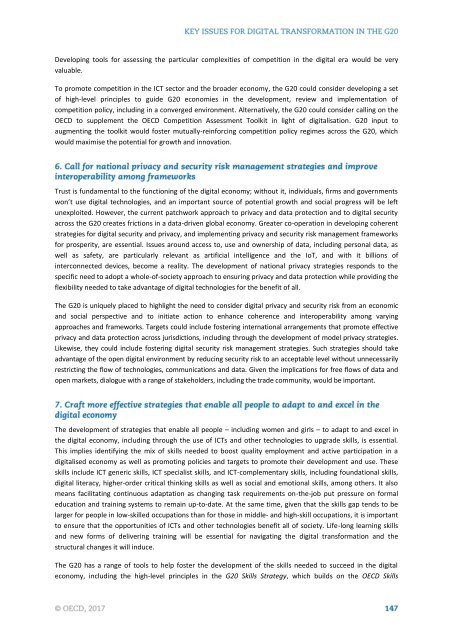KEY ISSUES FOR DIGITAL TRANSFORMATION IN THE G20
2jz0oUm
2jz0oUm
You also want an ePaper? Increase the reach of your titles
YUMPU automatically turns print PDFs into web optimized ePapers that Google loves.
Developing tools for assessing the particular complexities of competition in the digital era would be very<br />
valuable.<br />
To promote competition in the ICT sector and the broader economy, the <strong>G20</strong> could consider developing a set<br />
of high-level principles to guide <strong>G20</strong> economies in the development, review and implementation of<br />
competition policy, including in a converged environment. Alternatively, the <strong>G20</strong> could consider calling on the<br />
OECD to supplement the OECD Competition Assessment Toolkit in light of digitalisation. <strong>G20</strong> input to<br />
augmenting the toolkit would foster mutually-reinforcing competition policy regimes across the <strong>G20</strong>, which<br />
would maximise the potential for growth and innovation.<br />
Trust is fundamental to the functioning of the digital economy; without it, individuals, firms and governments<br />
won’t use digital technologies, and an important source of potential growth and social progress will be left<br />
unexploited. However, the current patchwork approach to privacy and data protection and to digital security<br />
across the <strong>G20</strong> creates frictions in a data-driven global economy. Greater co-operation in developing coherent<br />
strategies for digital security and privacy, and implementing privacy and security risk management frameworks<br />
for prosperity, are essential. Issues around access to, use and ownership of data, including personal data, as<br />
well as safety, are particularly relevant as artificial intelligence and the IoT, and with it billions of<br />
interconnected devices, become a reality. The development of national privacy strategies responds to the<br />
specific need to adopt a whole-of-society approach to ensuring privacy and data protection while providing the<br />
flexibility needed to take advantage of digital technologies for the benefit of all.<br />
The <strong>G20</strong> is uniquely placed to highlight the need to consider digital privacy and security risk from an economic<br />
and social perspective and to initiate action to enhance coherence and interoperability among varying<br />
approaches and frameworks. Targets could include fostering international arrangements that promote effective<br />
privacy and data protection across jurisdictions, including through the development of model privacy strategies.<br />
Likewise, they could include fostering digital security risk management strategies. Such strategies should take<br />
advantage of the open digital environment by reducing security risk to an acceptable level without unnecessarily<br />
restricting the flow of technologies, communications and data. Given the implications for free flows of data and<br />
open markets, dialogue with a range of stakeholders, including the trade community, would be important.<br />
The development of strategies that enable all people – including women and girls – to adapt to and excel in<br />
the digital economy, including through the use of ICTs and other technologies to upgrade skills, is essential.<br />
This implies identifying the mix of skills needed to boost quality employment and active participation in a<br />
digitalised economy as well as promoting policies and targets to promote their development and use. These<br />
skills include ICT generic skills, ICT specialist skills, and ICT-complementary skills, including foundational skills,<br />
digital literacy, higher-order critical thinking skills as well as social and emotional skills, among others. It also<br />
means facilitating continuous adaptation as changing task requirements on-the-job put pressure on formal<br />
education and training systems to remain up-to-date. At the same time, given that the skills gap tends to be<br />
larger for people in low-skilled occupations than for those in middle- and high-skill occupations, it is important<br />
to ensure that the opportunities of ICTs and other technologies benefit all of society. Life-long learning skills<br />
and new forms of delivering training will be essential for navigating the digital transformation and the<br />
structural changes it will induce.<br />
The <strong>G20</strong> has a range of tools to help foster the development of the skills needed to succeed in the digital<br />
economy, including the high-level principles in the <strong>G20</strong> Skills Strategy, which builds on the OECD Skills


